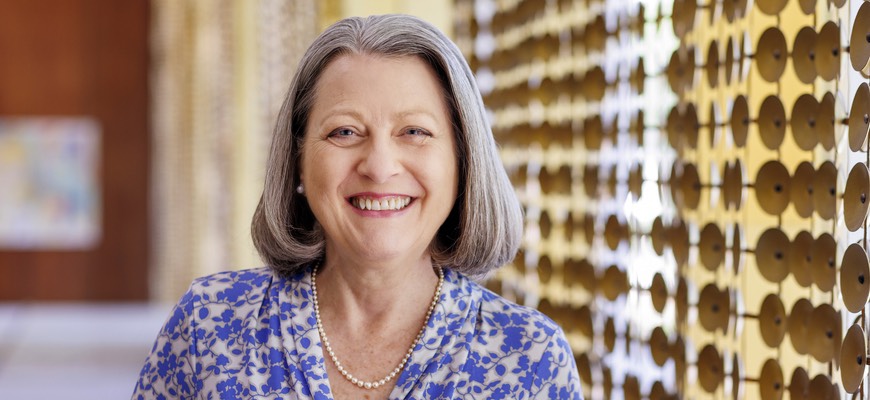
Cataloging a career
University Libraries staffer notches half-century mark in service
Posted on: May 26, 2022; Updated on: May 26, 2022
By Chris Horn, chorn@sc.edu, 803-777-3687
Lynda Wyman didn’t use her elementary education degree to pursue a career in teaching, but the classroom’s loss 50 years ago turned out to be the University of South Carolina’s long-term gain. Wyman continues to work on the campus where she launched her career in 1972.
The Charleston native had just graduated from Baptist College at Charleston (now Charleston Southern University) in December 1971 and needed a job right away — the newlywed was joining her husband who was in law school in Columbia.
“I thought, gosh, getting accredited and finding a teaching job in the middle of the school year? That’s not going to be easy,” Wyman recalls. “Someone suggested that I come check at the university, and in those days you could just walk in the employment office and say, ‘Do you have any job openings?’ ”
She started out as a typist in the graduate library, then located in McKissick, creating sets of cards for the library’s massive card catalog. Wyman liked the work and especially enjoyed her co-workers and the academic environment.
“When I got there, it hadn’t been very long that students were allowed to go into the stacks and find their own books. Before that you had to request books you wanted at a call window,” she says. “And there was no heat or air conditioning in McKissick’s stacks — the windows were open when it was warm, so students might just toss a book out the window and get it later if they wanted to avoid checking it out.”
There was no heat or air conditioning in McKissick’s stacks — the windows were open when it was warm, so students might just toss a book out the window and get it later if they wanted to avoid checking it out.
Lynda Wyman
Within six months, Wyman became a staff cataloger, making sure books ended up in their proper place on the shelves. Four years later, she and the rest of the library staff moved to the Thomas Cooper Library, which had undergone a massive expansion and became the centralized location for University Libraries.
“It was kind of sad to leave McKissick — we sat on top of each other there, but I think we knew each other better, too,” she says. “It was quite a production to move all those books, and our most important thing was the card catalog, which ended up right across from the elevators.”
Wyman became adroit in her cataloging skills, working with rare books, children’s books, films, sound and video recordings, maps “and any odd thing that came along,” she says. “Basically, it was a matter of figuring out where in the library something should go according to Library of Congress cataloging standards. It was only the catalogers who managed the card catalog, and everyone’s work was checked because if you put something in the wrong place, nobody would ever find it again.”
Eventually, paper catalog cards gave way to computerized databases, but the need for precise coding continued to be paramount. “If we put the wrong ‘1’ or ‘0’ in the catalog record, the title you were searching for wouldn’t come up,” she says.
After 38 years of cataloging — a career that spanned four university presidents and several libraries deans — Wyman retired from full-time service in 2010. But she was almost immediately back in the saddle on a part-time basis, working in the library’s development office. Now, 12 years later, she’s at the 50-year mark of university service.
“I feel lucky because so many people retire and then they ask themselves, ‘OK, what do I do today?’ If you have a chance to ease into it like I’ve done, I recommend it,” she says. “I never imagined I would continue working here this long, but I’ve enjoyed it — I really have.”
Share this Story! Let friends in your social network know what you are reading about